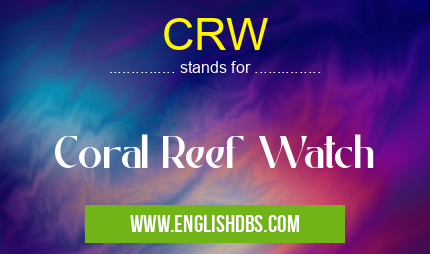What does CRW mean in UNCLASSIFIED
CRW stands for Coral Reef Watch. It is a global coral reef monitoring and forecasting system that provides near-real-time information on the status of coral reefs worldwide. CRW is a joint initiative of the National Oceanic and Atmospheric Administration (NOAA), the University of Queensland, and the Australian Institute of Marine Science.

CRW meaning in Unclassified in Miscellaneous
CRW mostly used in an acronym Unclassified in Category Miscellaneous that means Coral Reef Watch
Shorthand: CRW,
Full Form: Coral Reef Watch
For more information of "Coral Reef Watch", see the section below.
Function
CRW uses satellite data, in situ observations, and modeling to monitor and forecast coral reef bleaching events. Bleaching occurs when corals expel their symbiotic algae, which provide them with food and color. This process can be triggered by a variety of stressors, including elevated water temperatures, pollution, and disease.
CRW provides information on the severity, duration, and geographic extent of bleaching events. This information helps reef managers and conservationists to prioritize their efforts and implement measures to protect coral reefs.
Data Sources
CRW collects data from a variety of sources, including:
- Satellite imagery
- In situ observations (e.g., coral reef surveys)
- Numerical models
CRW uses satellite imagery to measure sea surface temperatures (SSTs). SSTs are a key indicator of the risk of coral bleaching. In situ observations provide information on the health of coral reefs, including the presence of bleaching and other stressors. Numerical models simulate the physical and biological processes that occur on coral reefs. These models can be used to forecast the likelihood and severity of bleaching events.
Essential Questions and Answers on Coral Reef Watch in "MISCELLANEOUS»UNFILED"
What is Coral Reef Watch (CRW)?
Coral Reef Watch (CRW) is a global program that provides near real-time information on the status of coral reefs around the world. It monitors the health of coral reefs and issues warnings of potential bleaching events.
How does CRW monitor coral reefs?
CRW uses satellite data to measure sea surface temperatures (SSTs) around the world. When SSTs rise above certain thresholds, CRW issues bleaching alerts, warning reef managers and scientists that corals may be at risk of bleaching.
What is coral bleaching?
Coral bleaching occurs when corals expel the algae (zooxanthellae) that live in their tissues. These algae provide corals with food and color. When the water is too warm, corals expel the algae, causing them to turn white. If the stress is prolonged, corals can die.
What causes coral bleaching?
Coral bleaching is primarily caused by elevated sea temperatures. Other stressors, such as pollution, overfishing, and ocean acidification, can also make corals more susceptible to bleaching.
How can I use CRW data?
CRW data can be used to track the health of coral reefs over time, identify areas at risk of bleaching, and plan conservation and management strategies.
Where can I find CRW data?
CRW data is available online at the CRW website: https://coralreefwatch.org/
Final Words: CRW is a valuable tool for coral reef monitoring and conservation. It provides near-real-time information on the status of coral reefs worldwide, which helps reef managers and conservationists to protect these important ecosystems.
CRW also stands for: |
|
| All stands for CRW |
